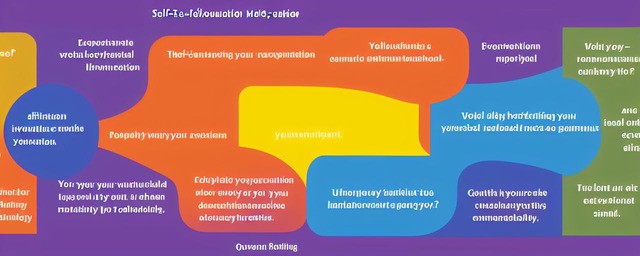
自我评价的方法
原|2023-12-30 08:43:48|浏览:38
1. Reflect on your strengths and weaknesses: Take some time to think about your abilities, skills, and qualities that you excel in. Consider areas where you might need improvement or areas that you feel less confident in.
2. Seek feedback from others: Ask trusted friends, family members, colleagues, or mentors for their honest opinions about your strengths and areas for improvement. Their perspectives can provide valuable insights and different points of view.
3. Set goals and track progress: By setting specific and measurable goals, you can assess your progress over time. Regularly evaluate how much you have achieved and if you are on track to meeting your objectives.
4. Compare yourself to benchmarks: Consider industry standards or other successful individuals in your field and evaluate how you measure up in terms of your skills and achievements. This can help provide a more objective perspective.
5. Conduct self-assessments: Use assessment tools or questionnaires designed to evaluate different aspects of your performance or personality. There are various self-assessment tools available online that can help you gain insights into your strengths, weaknesses, and personality traits.
6. Keep a journal: Maintain a journal or diary where you can regularly document your thoughts, experiences, and self-reflections. Looking back at your entries can allow you to identify patterns, track personal growth, and evaluate your progress over time.
7. Solicit evaluations from clients or customers: If you are in a customer-facing role, actively seek feedback from your clients or customers. Their opinions can help you understand how well you are meeting their needs and if there are areas for improvement.
8. Reflect on past successes and failures: Consider situations where you have achieved success or encountered challenges. Evaluate your actions, decisions, and behaviors during those times and identify what contributed to your success or hindered your progress. This will help you identify areas where you can build upon or improve.
9. Be open to constructive criticism: It is important to be open-minded and receptive to constructive criticism. Rather than being defensive, consider feedback as an opportunity for personal growth and improvement.
10. Regularly reassess and adjust: Revisit your self-evaluation periodically, as your abilities and circumstances may change over time. Continuously reassess and adjust your self-perception and goals to ensure continued personal and professional development.
猜你喜欢
- 茶的分类及代表品种
- 六大茶类的代表名茶分别有
- 茶的类型和代表
- 六大茶叶的分类及产地
- 庙的分类及代表
- 藻的分类及其代表
- 茶的分类及代表茶品特点
- 茶的分类及代表茶
- 简述茶类的分类及其代表性名茶
- 六大茶类的分类及代表茶
- 动物分类及代表
- 糖的分类及代表
- 茶的分类及代表茶叶
- 茶的分类及代表图
- 茶的分类及代表作
- 茶器按质地的分类及代表茶器
- 茶的分类及代表名茶教学设计
- 简述茶的分类及代表性名茶
- 请写出乌龙茶的分类及代表茶
- 法国雅文邑白兰地系列
- 雅文邑白兰地介绍
- 1952年法国雅文邑白兰地
- 法国雅玛邑白兰地
- 纽波利顿獒
- 法国犬品种
- 南非獒犬的优缺点
- 波尔多獒犬寿命
- 波兰狩猎犬
- 波尔多犬和罗威纳犬对比
- 波尔多犬和杜高对比
- 世界十大凶犬
- 护卫犬排行榜前十名
- 大红袍怎么泡效果好
- 大红袍怎么泡不开
- 大红袍怎么泡茶
- 大红袍怎么泡出来没颜色
- 大红袍怎么泡不苦
- 大红袍怎么泡多久
- 大红袍怎么泡才正确的特点
- 大红袍怎么泡没有柴味儿
- 大红袍怎么泡放多少合适
- 花香大红袍怎么泡
- 大红袍怎么泡茶好
- 大红袍是怎么泡的
- 大红袍怎么泡水好喝
- 大红袍用玻璃杯怎么泡
- 大红袍怎么泡味道浓一些
- 十大排名果花茶
- 十大花茶组合排名
- 十大花茶品种大全
- 十大花茶功效
- 十大花茶销量排行榜
- 十大花茶有哪些
- 十大花茶品种
- 十大花茶推荐
- 十大花卉排行榜
- 十大花卉
- 十大花茶调理内分泌
- 九五至尊秦昊明月关山
- 红茶冲泡工艺
为你推荐






































































